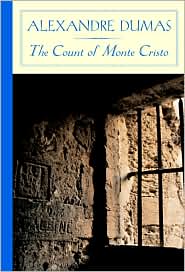 For those of you who don't know, The Count of Monte Cristo concerns a young Frenchman, Edmond Dantes, who seems to have everything in life going right for him. He's to marry his beloved Mercedes, and he will soon be made a captain of a merchant ship. But one Fernand Mondego and Danglar frame him for being a Bonapartist, and Dantes is sentences to imprisonment in the Chateau d'If. After fourteen years, Dantes manages to finally escape and returns to France as the mysterious Count of Monte Cristo to avenge his ruined life.
For those of you who don't know, The Count of Monte Cristo concerns a young Frenchman, Edmond Dantes, who seems to have everything in life going right for him. He's to marry his beloved Mercedes, and he will soon be made a captain of a merchant ship. But one Fernand Mondego and Danglar frame him for being a Bonapartist, and Dantes is sentences to imprisonment in the Chateau d'If. After fourteen years, Dantes manages to finally escape and returns to France as the mysterious Count of Monte Cristo to avenge his ruined life.Most of us think of this story with fondness because it has betrayal, romance, treasure, duels, poisoning, and revenge. I knew the gist of the story myself at an early age, and attempted to read a paperback copy when I was eight or nine. I didn't finish it, so thoroughly disappointed was I in discovering the true "lay of the land." Only recently did I buy a hardcover edition to replace my old battered paperback one, and only even more recently did I read its entirety.
I don't say this often - in fact, I think I have only said this once: the movie versions - especially the 2002 one with James Caviezel and Guy Pearce - are better than the book. This is a story that had a lot of potential, but because Alexandre Dumas wrote it, the majority of said potential was not taken advantage of. The first twenty chapters are good. The villains are introduced, Dantes is arrested and imprisoned, then he breaks out . . . and finds the treasure, which is when it starts to go downhill. For one thing, the treasure is one sad little box. Just one!! Massively disappointing for a nine-year-old, I can tell you that. Especially when every illustrated version I had looked at depicted the treasure as filling the entire cave (and I love how the cave is an underwater grotto in the 2002 film).
The Reader may then expect thirty chapters of pure blather. There is a mildly interesting scene involving Italian bandits (one of the male characters suffers us to read his comment on how he noted that many of the Italian bandits were quite handsome . . . Disturbing!), but Dumas manages to make that quite dull. I'm all for complicated revenge plans, but Monte Cristo carries it too far!! After thirty chapters, it picks up again for fourteen chapters, then sputters out for the last seven.
All in all, I found it a massive letdown. Again, the potential is there, but the plain truth is Alexandre Dumas is not a good writer. Oh, his style is okay - his dialogue often reads like a play, which can be a bit irritating at times. But there is nothing likable in his characters. Mercedes is a shallow woman, the villains really quite pathetic, and Dantes was likable up until the very end, when he runs off with a very young slave-girl (no, I am sorry, but he does not get reunited with Mercedes. I personally like the movie endings better, too). All the men are disturbingly light on their feet - especially the young dandies - and the women flighty and silly. And everyone is beyond melodramatic. Melodrama is fine when the Author is trying to make it humorous, but Dumas is a humorous writer (some of you may say that The Three Musketeers was light-hearted and humorous; that isn't the sort of humor I am speaking of).
Yes, The Count of Monte Cristo, while a good idea, falls quite short of the mark. I love classics and most of the time the Author's beautiful way of writing can make even the most boring story fun to read, but not so in Alexandre Dumas's case. College professors - those people who will say anything that makes them sound learned and lofty - may claim that Dumas is a masterful storyteller. I, a longtime bookworm and connoisseur of all things written, wholeheartedly disagree. The Count of Monte Cristo certainly is his best work, but that is only because it doesn't drag its feet the entire time.
So, if you are looking for a good classic to read and think to yourself, "Oh, I know the general gist of The Count of Monte Cristo. It sounds exciting!", stick to the movies. For once, they are actually better than the book.
Overall Rating: KK

No comments:
Post a Comment
Thank you for visiting 667B Baker Street! Please feel free to leave a comment; I love hearing from my Readers and I always try to respond, especially if you have a question!